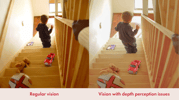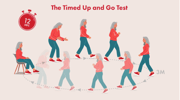Improve your sleep hygiene: our experts’ top tips for getting the best night’s sleep

Our treasured experts, psychologist Jo Hemmings and occupational therapist from The OT Service Kate Sheehan, share their top tips for improving your sleep hygiene and getting the best night’s sleep possible.
Sleep hygiene simply refers to healthy sleep habits – those that encourage the optimum amount of sleep, the best quality and preventing having trouble sleeping. There are several simple sleep tips that we can make to our evening routine to improve our sleep quality and avoid a broken sleep cycle.
So, what tips would we give for the best night’s sleep?
Kate Sheehan’s top sleep tips to boost your physical and cognitive health
It’s essential that we get a good amount of deep sleep and if we have disrupted sleep for even short periods of time it will have a significant effect on our mental, cognitive, and physical well-being since sleep plays a critical role in brain function, which can impact all our bodily systems.
Take a bath 30 minutes before you go to sleep
In 1997, Patricia Murphy conducted a study with her team and concluded that our body temperature drops through the day as we prepare for sleep. They charted the body temperature (skin and internal) of groups who bathed, showered and did neither. It categorically showed that the group who bathed were more rested and had a much higher quality of sleep.
The research showed that as the body prepares for sleep, it cools down; if we raise our temperature pre-sleep, ideally by 1-2 degrees, the rapid cooling encourages a more restful, deep sleep.
Have the correct lighting
As the day moves on, our bodies produce melatonin, which makes us feel sleepy, but this can be significantly affected if it does not receive the right cues from the environment. Dim your lights or use lamps that can be turned off as bedtime approaches.
Shut down electronics
The blue light emitted by your mobile or other screens restrains the production of melatonin, the hormone that controls your sleep-wake cycle and reduces the effectiveness of the sleep you have, resulting in waking up tired.
Wear socks to bed
Our extremities can become very cold, and socks can assist the body’s internal temperature regulation. A study from 2007 reported that adults who wore either normal or heated socks in bed got to sleep faster. Our body temperature drops during the night, reaching the lowest temperature around 4am. Warming up the feet and hands makes the blood vessels dilate, releasing heat through the skin and lowering body temperature. This sends a message to the brain that it is bedtime.
Take regular exercise
Thirty minutes a day of exercise that raises your heart rate will support good sleep hygiene and contribute to a healthy lifestyle which can add quality to your daily life.
Jo Hemmings’ top sleep tips for better mental health and wellness
Sleep not only helps stave off diseases, regulates our stress levels and leaves us feeling refreshed in the morning, it also makes a huge contribution to our cognitive function. Without enough quality sleep our ability to think clearly, concentrate and process memories and emotions are impaired.
Have a consistent sleep schedule
Try to go to sleep and wake up at about the same time every day — even on weekends. This helps support your sleep cycles and minimises any disruption to it. It also helps with daytime sleepiness, although for some people taking a short nap can encourage good sleep at night. For others, a nap is a disrupter. Learning how naps work for you is an important factor in establishing your perfect sleep cycle; just try to make it as early as possible in the day.
Maintain a comfortable temperature
A cool, dark, quiet room will help you fall asleep and stay asleep more easily. For most people, a bedroom temperature between 15.6°C and 19.4°C is the ideal temperature for sleeping.
It’s also important to make sure you have a comfortable mattress, pillows, and bed linen. You might want to change to a higher or lower Tog on your duvet depending on the season as well as invest in some black-out blinds or try an eye mask to ‘trick’ our brains into thinking it is dark. Turning your bedroom into a sleep sanctuary will benefit the quality of your sleep immeasurably.
Limit caffeine, heavy meals, and alcohol before sleep
While a glass of wine is okay in the evening, don’t combine it with a big meal that might cause your digestive system to interrupt sleep. Caffeine can last up to 7 hours in your system, so try to stick to tea and coffee (especially) in the morning or early afternoon only.
Only use your bed for sleep, sex, and relaxing activity
It’s important that your brain associates your bed with sleep. Sex can help us sleep, as can watching a little light TV and reading, but keep it to something light and soothing. Try not to work or make phone calls in your bedroom.
Manage your worries
Stress and anxiety can be one of the biggest barriers to sleep. Write down what you need to do tomorrow or during the week, so that you don’t spend time dwelling on your ‘to do’ list. Meditation or mindful breathing exercises can also help with lowering your cortisol and adrenaline levels – the two hormones that spike when we worry. Research has shown that a weighted blanket can help with sleeplessness and anxiety, as it mimics the benefits of deep pressure therapy.
Learn more about mastering your own sleep sanctuary with Stannah’s top tips, or find out how sleep can affect your physical, cognitive and mental health and the link between science and sleep.
Stay up to date
Latest Blogs

Whole Home Comfort with Stannah and HSL

Dame Zandra Rhodes x Stannah: When accessibility meets style
Could more people benefit from home adaptation support for hidden disabilities?
50 years of Stannah Stairlifts – A milestone grounded in purpose

BBC’s Dr Punam Krishan reveals a little-known Parkinson’s symptom to watch for...

Are you at risk of falling? Dr. Punam Krishan’s simple 12-second test could tell you...

Snore Wars: Could sleeping separately be the secret to a better night’s rest?

Proud to carry the Made in Britain mark!
Stairlifts made for you
All our stairlifts whether straight or curved are customised to suit you and your home so call now to arrange a visit to get your FREE personalised quote!